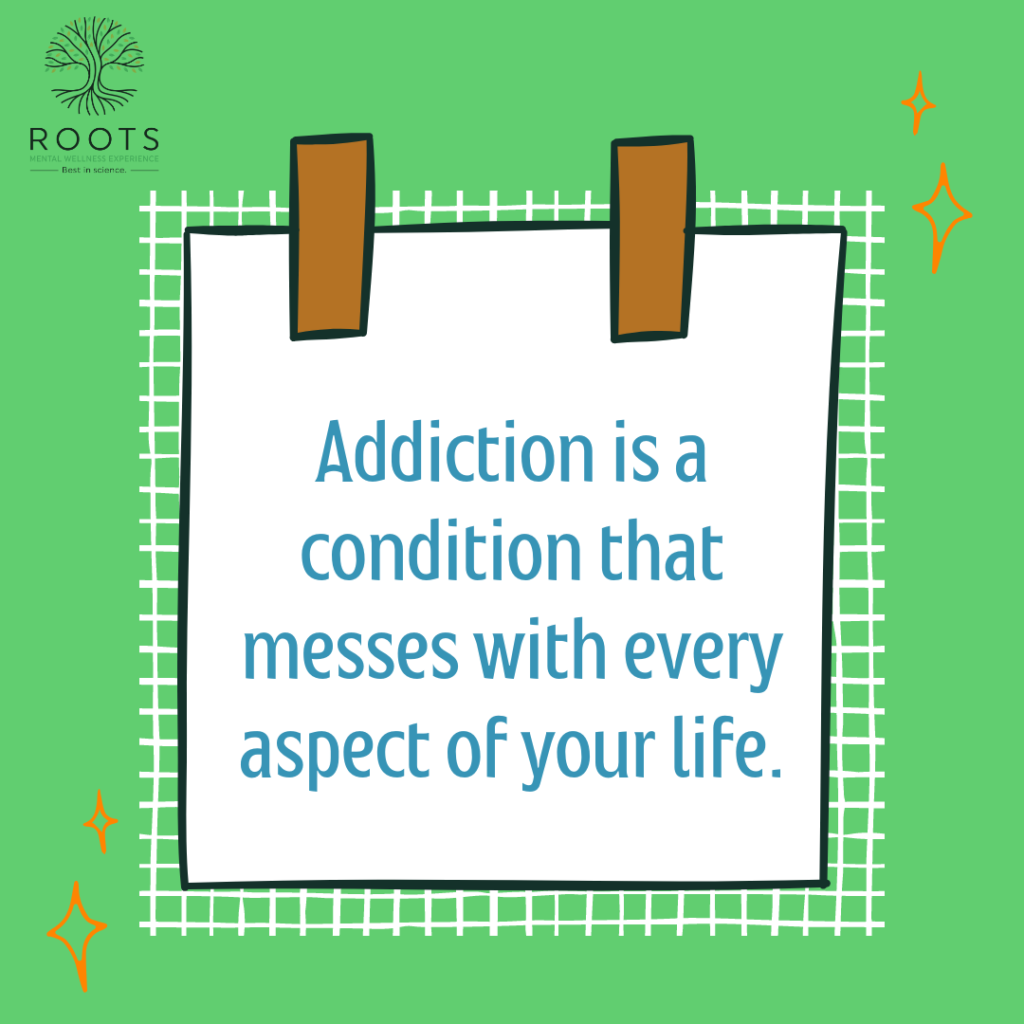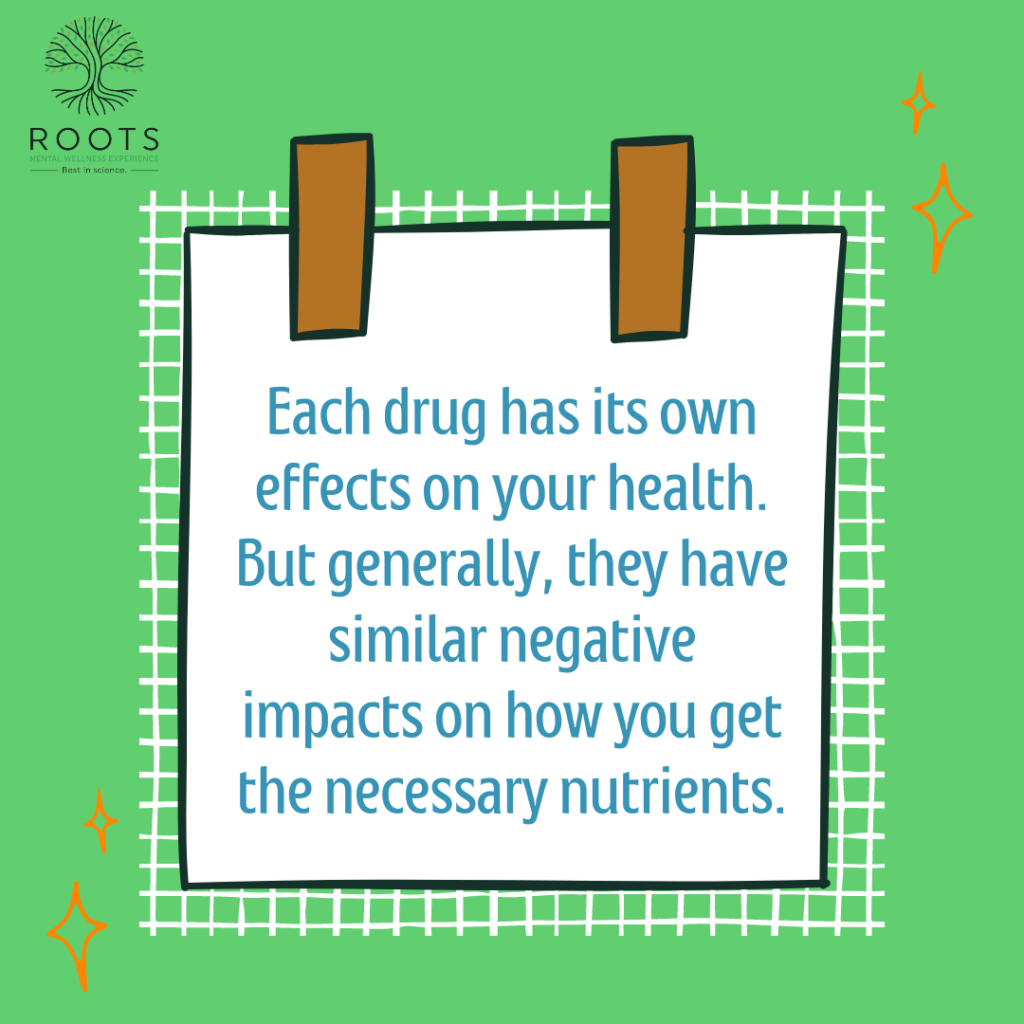Addiction is a condition that messes with every aspect of your life. It ruins your mental health, emotional well-being, social life, and behavioral and psychological patterns. But addiction, as a disease, also dramatically impacts your physical health.
If you are struggling with addiction, you’ll tend to let yourself go– neglecting personal hygiene, forgetting to eat, and spending hours thinking about the substance. The drug itself also does things to your body that are detrimental to your health.
In other words, addiction destroys your nutrition. In this article, we’ll go over how substance abuse affects your physical well-being. Moreover, you’ll learn why proper nutrition is crucial in recovery.

How Does Addiction Affect Nutrition?
The common notion is that substance abuse leads you to forget about yourself and focus on the substance you take. As a result, you eat less and take the substance more, affecting your nutrition and health.
While that is true, drugs have a more direct impact on your physical health. The substances alter how and when you intake food, nutrient absorption, and metabolism. Those result in an adverse change to your nutritional status and body composition. One study narrated how people who use drugs are prone to malnutrition.
Each drug has its own effect on your health. But generally, they have similar negative impacts on how you get the necessary nutrients.
- Change of appetite
Aside from spending time talking and thinking about drugs, your appetite can change for the worse. Many drugs, like alcohol and narcotics, suppress your appetite, causing you to forget to eat. With that, you eat less or nothing at all.
And when you do take drugs, they replace the nutrition your body needs.
- Crave for “unhealthy” food
Many substances can also make you crave lower-quality food, like junk and fast food. And when you feel this hunger, it becomes your top priority.

This is a big concern for people struggling with addiction. Because they constantly take drugs, they will always have an appetite for these nourishing foods.
- Overeating
Unlike the first problem, where people don’t eat, some drugs can also make one overeat. Marijuana, specifically, makes addicts overeat. And they usually crave the junk and fast food mentioned above. This can lead to severe weight gain and all the conditions that come with that.
- Organ damage
Most drugs can also cause direct damage to organs responsible for nutrient processing. They can harm your pancreas, gastrointestinal tract, stomach lining, and liver. When these organs sustain damage, it will create problems with digestion and nutrition storage, and absorption.
Chronic disorders in your gastrointestinal tract are among the problems you may encounter. They prevent absorbing nutrients from food effectively.
- Weaker immune system
Drugs take a toll on your immune system, too, suppressing it. You have little defense against illnesses and infections with a weaker immune system.
How Do Drugs Affect Nutrient Absorption?

One of the main ways substance addiction damages your physical health is through nutrient deficiencies.
Drugs and alcohol prevent your body from absorbing the nutrients your body needs. These substances block or damage certain body processes, one of which is digestion. If you use them regularly, the effect will be much more significant.
Again, drugs affect your appetite. They can make you overeat, crave unhealthy foods, or just not make you want to eat anything at all. These three instances hinder your body from getting the nutrients it needs to live.
If you have a deficiency in nutrients for just a short period, that can cause various physical consequences. And if not caught in time, some can even lead to permanent damage.
That’s why the importance of nutrition in recovery is vital. You need to regain or make up for all the nutrients you lost at the peak of your addiction.
What Is An Example Of Drug-Nutrition Interaction?
Drug-nutrient interactions are the effects of a drug on food or a nutrient in food. While some are harmless or have little effect, other instances pose dangers to your health.
You’ll commonly hear about these interactions with food and medication. But, of course, more dangerous substances have a more scary effect.
For example, excessive alcohol drinking or abuse can cause severe damage to your pancreas and liver, two of the most critical digestive organs. The pancreas:
- Produces necessary enzymes for digesting carbs, proteins, and fat
- Produces hormones needed to balance blood sugar
The liver breaks down toxins like alcohol. Heavy drinking prevents it from working properly, allowing the substance to circulate your blood longer and causing more damage to your digestive system.
Alcohol abuse also causes serious deficiencies in folic acid, vitamin B6, vitamin B1, or thiamine. Lack of these can result in anemia.

Why Is Nutrition Important In Recovery?
Long-term substance abuse causes great stress and a decline in your mind and body. Nutrition and recovery go hand in hand. Getting back on a healthy diet will help you recover and heal your physical, mental, and emotional health.
In other words, proper nutrition increases your chances of getting and remaining sober. With a proper diet, your body becomes stronger and more equipped to fight addiction.
More specific benefits of a healthy and balanced diet include:
- Repairing damaged organs and tissues
- Boosting your immune system
- Increasing your energy
- Improving your mood
- Decreased chance of relapsing due to depression or fatigue
Healthy Body, Healthy Mind
In more ways than one, addiction destroys nutrition. The longer you continue abusing substances, the worse the consequences on your body. That’s why proper nutrition is a big part of recovery. Once you start taking more care in what you eat, you’ll not only have a stronger body but a stronger mind to fight your addiction.
Are you looking for rehab programs in California? Choose Roots Through Recovery. You can schedule an appointment and visit us at 3939 Atlantic Ave Suite 102, Long Beach, CA 90807, United States. You may also contact us at 562-352-2035, email us at info@roots-recovery.com, or visit our website.




